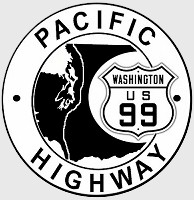
The Historic Pacific Highway
in Washington
Seizure of the Hudson Bay Company Steamers Beaver and Mary Dare Part 2

The Historic Pacific Highway
in Washington
Seizure of the Hudson Bay Company Steamers Beaver and Mary Dare Part 2
Seizure of the Hudson Bay
Company Steamers Beaver and Mary Dare Part 2
The First United States Court at Olympia
Washington Standard
May 30, 1868
December 1st. Colonel Ebey was this day directed by the Collector to make a strict examination of the steamer "Beaver," which entered in ballast. On his return he reported that she had no ballast on board except her coals, but that he found a considerable quantity of "Indian trading goods," amounting to at least $500. He also reported that before the vessels had come to Olympia (the port of entry) they had anchored at Nisqually, landing six passengers, and remained there some 15 hours, boats constantly passing between them and shore.
On an examination of the
cargo of the Mary Dare she was found to have on board a contraband
package of refined sugar weighing 230 pounds. By the 103d section of the act
of March 2d, 1799, refined sugar cannot be imported in packages of less than
600 pounds weight, under penalty of forfeiture of the sugar and the vessel
in which it is imported. The Collector therefore ordered the seizure of both
vessels, which was done accordingly this afternoon.
First Term of U. S. Court.
The act just narrated was the occasion for a special term of the United
States district court of the Third judicial district of Oregon, in
admiralty, which was held at Olympia January 20, 1852, and was the first
federal court held in this town. We again recur to the diary: January 17,
1852. In the afternoon Hon. William Strong, judge of the Third judicial
district, arrived, accompanied by Simon B. Marye and David Logan, Esquires,
from Portland. Mr. Marye is the attorney of the Hudson's Bay company and
Logan acts for the U. S. district attorney, in the seizure cases.
We soon learned from the party that the U. S. marshal had, under the act of March 3, 1847, "to reduce costs and expenses of proceedings in admiralty," accepted bond in the sum of $13,000 for the Mary Dare and her cargo. January 20th. Organization of special term of court. Quincy A. Brooks, Esq., acting clerk; A. M. Poe, deputy U. S. marshal. Admission of D. R. Bigelow, Q. A. Brooks, 'S. P. Moses, I. N. Ebey and Elwood Evans, attorneys of the district courts of Oregon.
January 21st. At court
today libels filed against the captain (C. E. Stuart) of the steamer Beaver
and against certain articles of cargo and praying the usual process. The
court granted warrant against the person of Captain Stuart but denied the
arrest of the steamer, holding that the vessel was not liable for violations
of the revenue law by the master of a vessel, who was punishable by fine and
imprisonment. Court then adjourned.
Petition to Treasury.
22d inst. A motion is made in court to compel the Collector to proceed. No
defense was interposed in the libel against the Mary Dare and the
sugar, except the notice by Dr. Tolmie of a petition to the secretary of the
treasury, praying a remission of the forfeiture. Judge Strong at once
resolved himself into a commissioner to take the testimony and certify it up
to the treasury department.
Poe returned without his prisoner, reporting Stuart as having left Nisqually in a large canoe for Fort Victoria. The proceedings seem to sum up in this: The trading goods of the Beaver are seized; the Beaver is not liable for the acts of her late master (now a fugitive); the Mary Dare and sugar are bonded in $13,000 to await the action of the treasury department on the petition of Dr. Tolmie.
24th. Court adjourns.
Duties are paid on the Mary Dare's cargo and the court party leave
for Columbia river. Sunday 25th. The two ornaments of our harbor for a month
past left today. The vessels have gone with the Royal George flying
saucily at the peak, defiantly proclaiming another triumph of the Hudson's
Bay company on American soil.
Nisqually a British Fort.
They go to Fort Nisqually, a British fort within American territory, quasi a
mere trading post. Over it today floats the British ensign. How long are we
to be constantly reminded of the surrender of 5 degrees and 40 minutes of
latitude, simply because Great Britain asserted she would have it; to
witness the more humiliating exhibit of a British institution, foreign in
all its intentions and spirit, living upon and still claiming American
territory, sapping its wealth, destroying American industry by an organized
competition, insidiously controlling our native population.
A company made up of aliens, the chief of whom and the most intelligent of those I have yet met (Dr. Tolmie), told me within a few days that "his interests would not permit him to become an American citizen." The sequel to the above is easily told and like unto it: At the April term, 1853, of the said district court, the case against C. E. Stuart was stricken from the docket. In the suits against the Mary Dare and certain articles of merchandise of cargo, steamer Beaver, will be found this entry: "In this cause, the forfeiture having been remitted by the secretary of the treasury, the costs are taxed at" etc.